You’re looking for a Magento developer for your eCommerce business. Let’s be honest — no one wants to lose money and time. That’s understandable.
Magento is a powerful but complex platform; finding the right developer is no small task. The Magento world is full of self-proclaimed “experts” who talk the talk but can’t walk the walk. And hiring the wrong person? That can cost you time, money, and a lot of nerves.
In this guide, we’ll break down everything into simple parts: should you go with a freelancer, a Magento agency, or build an in-house team? How do you spot a real Magento pro? Where do you even find these developers? And, of course, how much is this going to cost?
Our team promises you will know how to hire a great Magento developer. So, grab a coffee/tea, get comfortable, and let’s get started!
What are the Benefits of Using Magento for a Thriving eCommerce Business?
Since you’re here looking for Magento developers, chances are you’re already using Magento or at least seriously considering it. So, let’s skip the basics and get straight to why Magento is worth sticking with — and why finding the right developer is so important.
- Magento will grow with your store: more products, more traffic, more sales, the bigger Magento. The right developer will ensure your store can handle high traffic loads without slowing down or crashing at the worst possible time (aka Black Friday).
- Magento is super customizable. A standard approach just doesn’t work in eCommerce. Magento enables customization — filtering, unique checkouts, and personalized recommendations. But customization requires expertise.
- A slow site kills conversions. Magento has all the tools to keep your store fast, but it’s out-of-the-box and not continually perfectly optimized. A good developer will tweak caching, optimize images, and configure servers to ensure your site runs smoothly.
- Magento has excellent security features. It will work only if properly maintained. Regular updates, patch installations, and security audits are critical to keeping your store safe from cyber threats.
- Magento has it all: payment gateways, CRMs, shipping providers, and ERPs. It connects with all of them, but sometimes, setting it up isn’t as simple as clicking a button.
- Magento is an investment, but it saves money in the long run when optimized correctly. A well-built store means fewer bugs, downtimes, and lower maintenance costs. Hiring a skilled Magento developer prevents expensive fixes later.
- Magento has the power to take your eCommerce Magento business to the next level, but only if it’s in the right hands. Who should handle your development: Magento freelancers, agencies, or an in-house team? Let’s break it down.
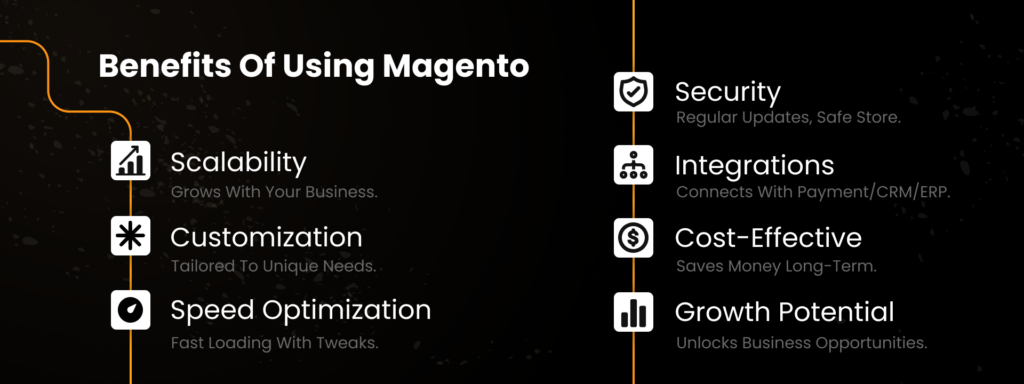
Freelancer vs. Agency vs. In-House Magento Team: Choosing the Right Option
Hiring a Magento developer is a lot like choosing how to get your car fixed. You can hire a mechanic (freelancer), a well-equipped auto shop (agency), or work with your in-house expert full-time. Each option has pros and cons; the right choice depends on your budget, project, and long-term needs.
1. Freelancers – The Solo Mechanics
It is the best choice for businesses that need occasional Magento work but don’t have complex, ongoing projects and want quick, minor fixes. You will pay freelancers for specific tasks, and they sometimes cost less than an agency or in-house developer. They’re variants for updates, minor bug fixes, or small customizations.
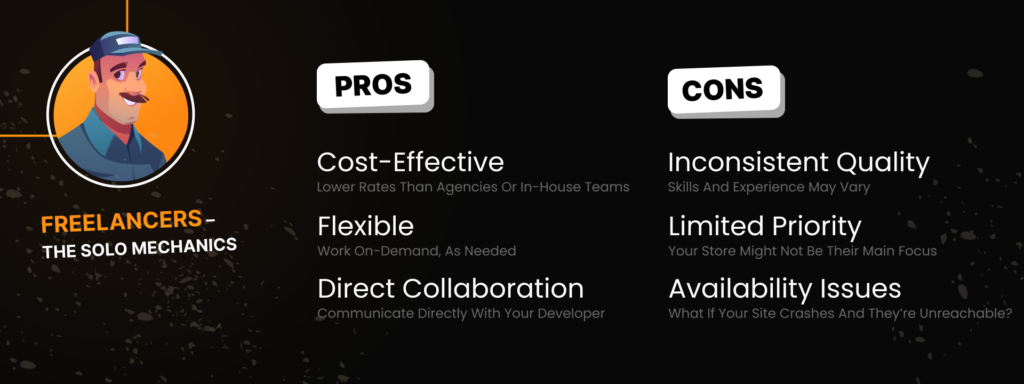
2. Agencies – The Full-Service Auto Shop
Best choice for medium to large businesses that need ongoing Magento development and support. You will get developers, designers, project managers, and even strategists working on your store. “The Full-Service Auto Shop” is ideal for businesses that need regular updates, new features, or a complete site rebuild.
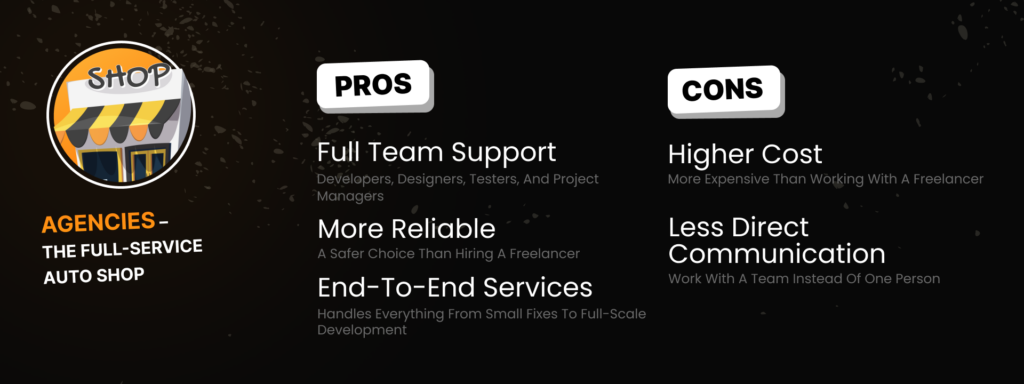
3. In-House Team – Personal Auto Expert
Best choice for large eCommerce stores that need ongoing Magento development and support services. It is like having your private mechanic in your garage. They work exclusively with your store, which means faster turnaround times and deep knowledge of your business and website.
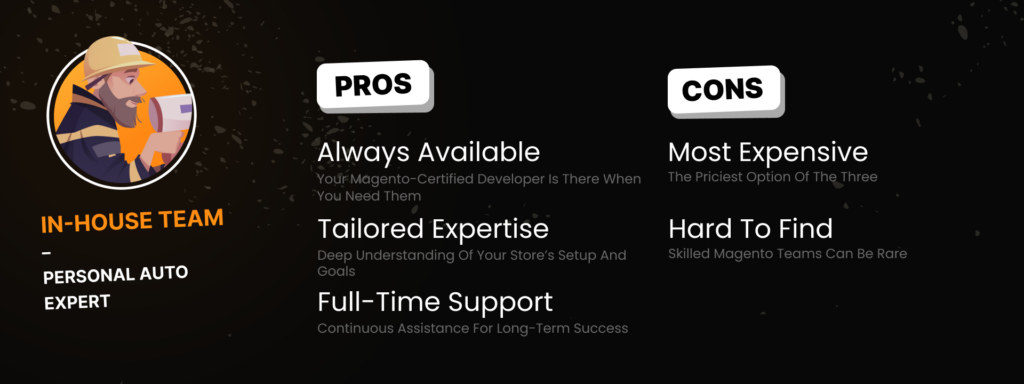
The choice is yours. Whether you hire a freelancer, agency, or in-house Magento specialist, you need to ensure the service provider is truly professional.
Not sure where to start?
Book a free consultation and get expert guidance.
How to Find and Hire Perfect Magento Developers [Certification & Expertise]
Before searching for a suitable candidate for the role of your technical partner, understand what goals you are pursuing and what outcome in numbers you want to reach with this solution. It’s fair whether you need to build a website from scratch or look for the best Magento 2 custom extension development service on the market.
Like any other website, online stores based on the Magento platform consist of two parts — front-end, visual elements with which customers interact with the site, and back-end or server-side, where all business logic processes are executed. Depending on what parts of your site need updating or establishing new features, you need Magento experts with different skills.

Magento Certifications
In addition to the traditional ways to evaluate a service provider, such as looking at a portfolio and reviewing client feedback, Magento provides its customers with additional criteria to make a proper choice. The eCommerce platform has an advanced training and certification program for third-party specialists. Applicants must meet strict standards and pass an exam to be certified by Magento.
Many certificates confirm a specialist’s skills in various areas of Magento. Depending on your task, you can ask the developers to present their certificates to verify their competence.
But here’s the catch: some developers are great at real-world Magento work but don’t bother getting certified. Others might have a certificate but struggle with complex, custom solutions.
Suppose you need a Magento 2 developer to create a new eCommerce website from scratch. In this case, you can first ask a candidate to demonstrate “Magento 2 Solution Specialist certification”.
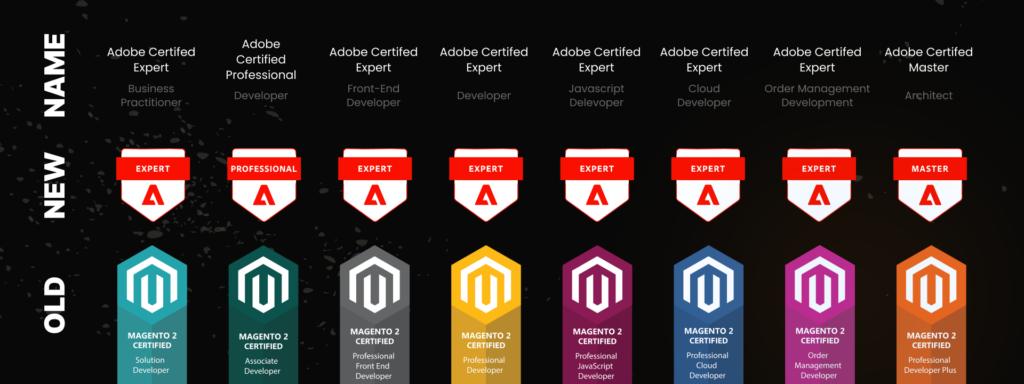
Real Experience
Certifications are great, but real working experience with Magento matters more valued. Before hiring a Magento developer, check their past projects. Ask for links to stores they’ve worked on and see if those stores are still running smoothly. Look for case studies and testimonials — real success stories from past clients can tell you a lot.

Magento can be tricky, so knowing how the developer handles challenges is essential. You may ask them how they’ve solved complex issues like improving store speed, fixing checkout issues, or integrating third-party tools. Their answer will tell you if they genuinely know their stuff.
Now, you have an additional tool to identify a higher-level Magento expert. However, the next question is, where do you look for one?
Where to Find Magento Developers?
So you know you need a Magento-certified developer. But where in the world do you find a good one? Because let’s be honest — plenty of people out there say they know Magento, but when it comes to real projects, they can barely install an extension properly.
One solid option is Magento partner agencies. These are companies officially recognized by Adobe (Magento’s parent company), meaning they’ve got certified devs and a track record of delivering solid projects. This is a safe bet if you’re running a serious store and need a whole team to handle development, support, and optimization.
If you don’t need a whole agency and want an experienced freelancer, Upwork is probably the best place to start. Unlike Fiverr (hit-or-miss for technical work), Upwork has some serious Magento talent. Look for freelancers with a 100% job success score, at least a few years of Magento experience, and strong client reviews.
Another trick is to check out Magento Stack Exchange and Adobe’s Magento forums. If you see someone constantly giving great answers and troubleshooting Magento issues for others, there’s a good chance they know their stuff. Reach out and see if they’re available for freelance work.
Then there’s GitHub and open-source contributions. Magento developers who contribute to open-source projects or build Magento extensions are usually the real deal. Look up Magento-related repos, see who’s contributing, and check their code quality.
And, of course, there’s always LinkedIn. Search for Magento developers, check their recommendations, and message them directly. LinkedIn is one of the best places to start if you’re looking to hire someone full-time. You can also post a job opening in Magento-related LinkedIn groups.
There are many online platforms where you can find specialists from all over the world. The most famous are:

On these sites, you can post a description of your task, wait for specialists to respond, or browse through the lists of specialized Magento developers and apply directly. The advantage of such sites is that you can efficiently study the candidate’s past projects and read reviews before signing a contract. In addition, payments and contracting through such marketplaces make the partnership safer for both sides.
The bottom line? The best Magento developers don’t come to you; you must do some digging to find them. But if you look in the right places and vet them properly, you’ll end up with someone who knows Magento inside and out. So, grab that coffee again and start hunting.
How Much Does it Cost to Hire Magento Developers?
It depends. The longer answer? Magento development can be expensive, and this is for good reason. The platform is powerful but also complex. If you’re looking for a real expert, you must be ready to invest.
- A freelance Magento developer usually charges anywhere from $30 to $150 per hour, depending on their experience, location, and skill level.
- If you go with an agency, expect to pay $75 to $250 per hour, sometimes even more. Agencies cost more because you hire a whole team, including project managers, QA testers, and designers.
- If you want to hire an in-house Magento developer, their salary will depend on their location. In the US, UK, or Western Europe, experienced Magento devs make $80,000 to $150,000 per year. In Eastern Europe (Ukraine, Poland, etc.), you can find great developers for $40,000 to $80,000 annually.
But here’s the thing — you get what you pay for. Spend wisely, and you’ll save yourself a ton of headaches down the road.

11 Tips to Hire the Best Magento Developers [Checklist]
- Check their portfolio for live Magento projects.
- Look for Magento certifications, but prioritize real-world experience.
- Read client reviews on Upwork, LinkedIn, Clutch, or Trustpilot.
- Test their problem-solving skills.
- Confirm their availability and response time to align with your project needs.
- Discuss pricing upfront.
- Check their familiarity with Magento extensions and third-party integrations.
- Ensure they have experience with version control systems like Git.
- Ask about their workflow and project management approach.
- Make sure they understand SEO best practices for Magento stores.
- Choose a developer who not only codes but understands eCommerce strategy.
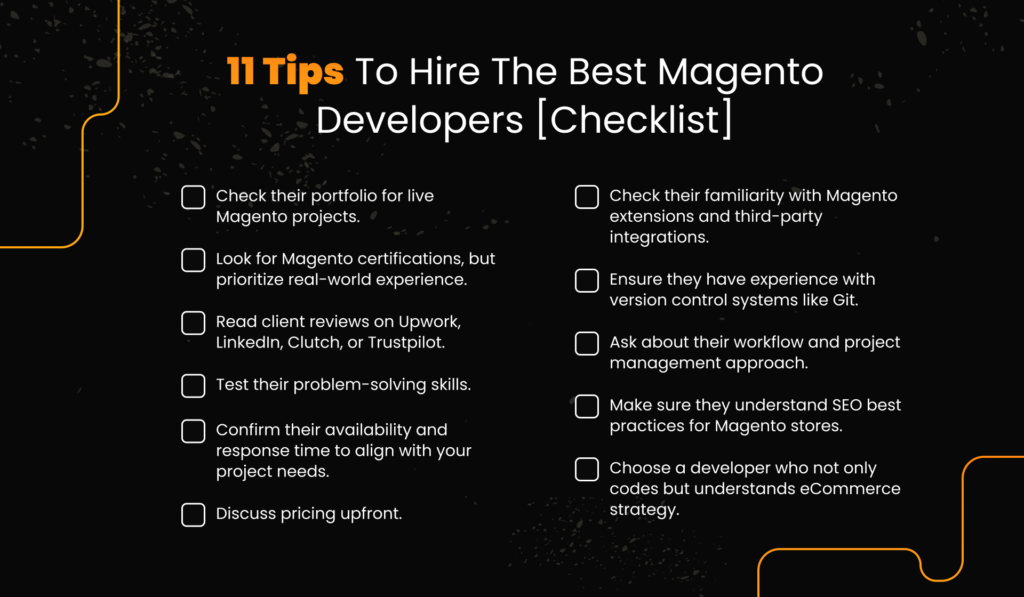
Why is ITDelight the Best Company to Help You Hire Magento Developers?
Now, you are empowered with basic knowledge of how to hire a Magento developer. Let’s resume all points:
- Set a goal — what needs to be done, what time frame, what result must be achieved.
- It’s best if someone recommends a contractor. If this is not possible, look for professionals on particular sites.
- Research potential developers or agencies — ask for certifications and look at portfolios and reviews.
However, there is an alternative that will save you from the above steps by offering better results. Contact Magento experts to receive the most appropriate high-quality solution on time and within budget. We have certified professionals with extensive experience creating and customizing Magento eCommerce sites. Don’t look for a solution somewhere when it’s here.

